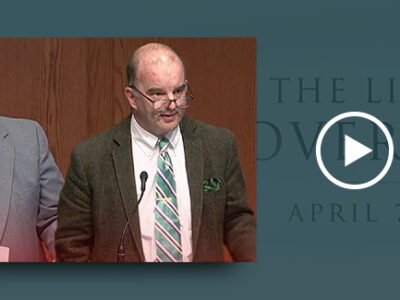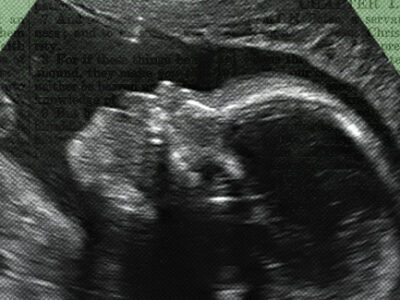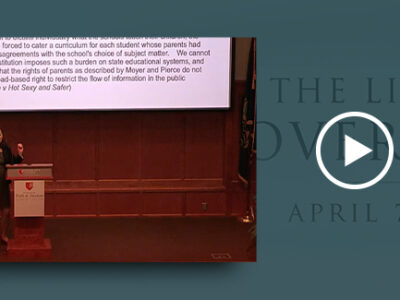Editor’s Note: The “V&V Q&A” is an e-publication from the Center for Vision & Values at Grove City College. Each issue will present an interview with an intriguing thinker or opinion-maker that we hope will prove illuminating to readers everywhere. In this latest edition the Center for Vision & Values at Grove City College interviews its executive director, Dr. Paul Kengor, in the first of a series of Q&As with participants in the forthcoming April 10-11 conference, “Church & State in 2008,” to be held on the campus of Grove City College.
V&V: Dr. Kengor, the title of this conference, “Church & State in 2008,” has obvious implications for the current political season. Before we address that, let’s begin with a provocative question you’ve considered: Could America be governed by an atheist?
Dr. Paul Kengor: That’s the subject of one of my papers for this conference, which are included in a reading packet by our faculty participants. My answer is that we should, by all means, prefer a religious believer in the White House. I guess I’m bucking the trend at a time when the likes of Christopher Hitchens proclaim that “God is not great.”
The fact is that a believer in the White House has advantages over a non-believer. My argument focuses on accountability. There is an obvious difference between leaders who believe that Someone is watching them vs. those who think no one is watching them. The former are accountable to something Higher. That simple difference has profound ramifications. As George W. Bush has said, “Faith gives us conscience to keep us honest, even when nobody else is looking.”
Bush, for instance, believes that Someone is always looking. That Someone stands as a Supreme Judge of George W. Bush’s actions, all of which He most assuredly sees, even when no one else sees. Importantly, this does not guarantee that Bush will make right decisions all the time, or even a majority of the time. Nonetheless, it is a crucial external check on his actions: a Higher plane with eternal consequences, which in the heart and mind and soul of a believer trumps conventional government checks and balances.
V&V: You’re not saying that voting for a believer is an assurance of a good president.
Kengor: That’s right. All of our presidents, every single one of them, have believed in God, and all of them have made poor decisions. Some made terrible decisions. So, I don’t want any silly emails from atheists claiming I’ve said something I haven’t.
By contrast, it must be acknowledged that far more damage has been caused, especially over the last 100 years, by non-believing leaders, by atheists who firmly believed that no one was watching them. The 20th century’s most vicious leaders, who now stand as history’s greatest killers, were atheists: Mao Tse-Tung, Lenin, Stalin—those three alone accounted for over 100 million deaths—and the likes of Pol Pot, who annihilated 20-40 percent of the Cambodian population in four years.
Needless to say, this is not to say that all atheists are murderers.
Generally speaking, it is a good thing to have a leader who fears the Lord, who wants to please God, and who hopes and prays his decisions will secure him a spot in heaven rather than eternal damnation. Chances for good increase rather than decrease—rise up rather down—when the decision-maker chooses God instead of rejects God. God’s presence is superior to God’s absence.
V&V: Are you saying that America should have a religious test for the president?
Kengor: Of course, not. The Constitution prohibits a religious test. This nation is not a theocracy, and the president is not required to be a believer. So, my argument is more an argument for a choice of president.
By the way, I’m hardly alone in my view. It’s no coincidence that we’ve never had an avowed atheist elected president. And here’s a wild prediction: we won’t have one in 2008 either!
V&V: You give additional reason why our presidents need faith. What are some of those?
Kengor: I recall another incident involving George W. Bush, when he was interviewed by Jim Lakely, White House correspondent for the Washington Times. Bush said he could not imagine how someone could survive the presidency without faith in God. His response was historically not unusual. President Lincoln was said to remark that he was frequently driven to his knees “by the overwhelming conviction that I have nowhere else to go.”
The presidency is an extremely difficult job. Harry Truman called the White House “the Great White Jail.” Where does the president look when he is alone? Sometimes you have nowhere to look but up. A better question is where does the atheist look? Where would an atheist president find the sustenance to persevere?
V&V: Speaking of George W. Bush, your conference talk will compare the faiths of two leading Methodist politicians—President Bush and Senator Hillary Clinton. Give us a glimpse of that talk.
Kengor: I have the unique position of being the only person on the planet crazy enough to write spiritual biographies on both of these individuals. While there are obvious differences in how their faith affects their policy preferences—particularly on issues like abortion—there are also some similarities that will surprise people. To hear those, you need to register for the conference!
V&V: This faith factor is once again an issue in the presidential race, right?
Kengor: It sure is. All the candidates are professing Christians, but there’s much more to it. Consider: As both parties realize, it was the “values voter” who was credited with twice electing George W. Bush. The Democrats know this painfully well. Hillary Clinton responded to the 2004 vote by hiring Burns Strider, a Democratic Party strategist who advises candidates how to reach out to pro-life evangelicals. Barack Obama spends just about every Sunday morning campaigning in a church. He and Hillary have politicked in churches in a way that George W. Bush would not be permitted by the liberal press.
V&V: This conference will look not only at the current presidential race but previous ones as well.
Kengor: Yes, this issue is as old as the republic itself. We will show that from the outset of the conference as Professor Gary Smith kicks it off with his fascinating insights into Thomas Jefferson and church-state separation. We are also looking forward to a lecture from Grove City College President Richard Jewell, who will examine probably the most interesting faith-related presidential race of them all—the 1960 contest between Kennedy and Nixon.
V&V: Who are some of the other speakers in this conference?
Kengor: I’m afraid to comment because I don’t want to leave out anyone. One can’t-miss event will be our Thursday evening, April 10, debate between FoxNewsChannel’s “Beltway Boys,” Fred Barnes and Mort Kondracke, two men of faith with deep interests in faith and politics, albeit from differing right-left perspectives. The main event the next evening will be Michael Duffy, the highly respected White House correspondent for Time magazine, who recently completed an excellent book on Billy Graham, The Preacher and the Presidents. We will do an interactive Q&A with the Wall Street Journal’s Naomi Schaefer Riley, author of God on the Quad. Michael Cromartie of the Ethics and Public Policy Center will speak twice, including as the chapel speaker on Thursday morning. We will also be joined by columnist Don Feder and our complement of incomparable faculty.
Also, we will again have a bunch of media there, including Lindsay Boyd of Townhall.com, who will blog the conference, and the terrific Michael Medved, who will both speak and broadcast his nationally syndicated radio show from our atrium.
As always, our goal is to educate and inform in a thoughtful manner, and with a variety of perspectives.
V&V: How do we register or learn more about the conference?
Kengor: Go to our conference website or call Brenda Vinton at 724-450-1541. The website includes the schedule and agenda.




